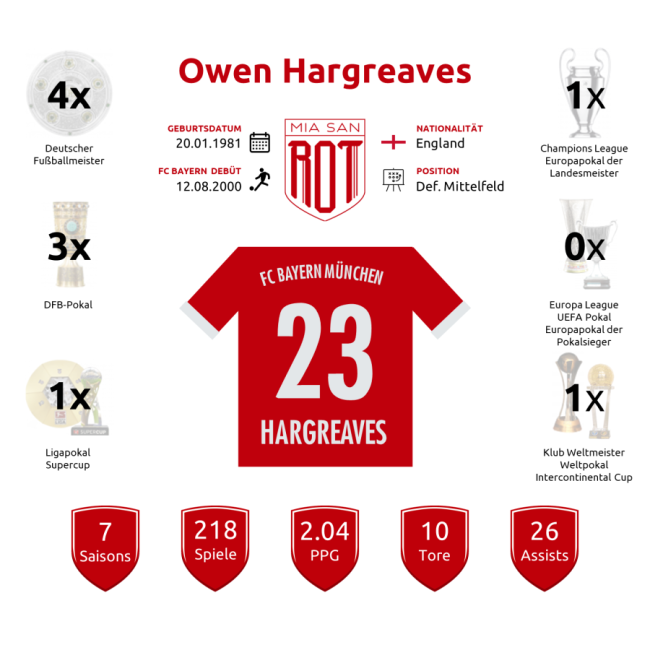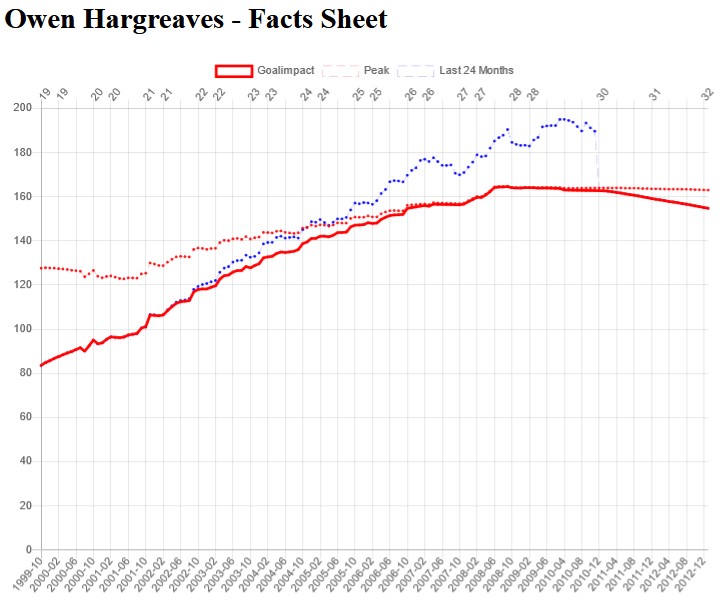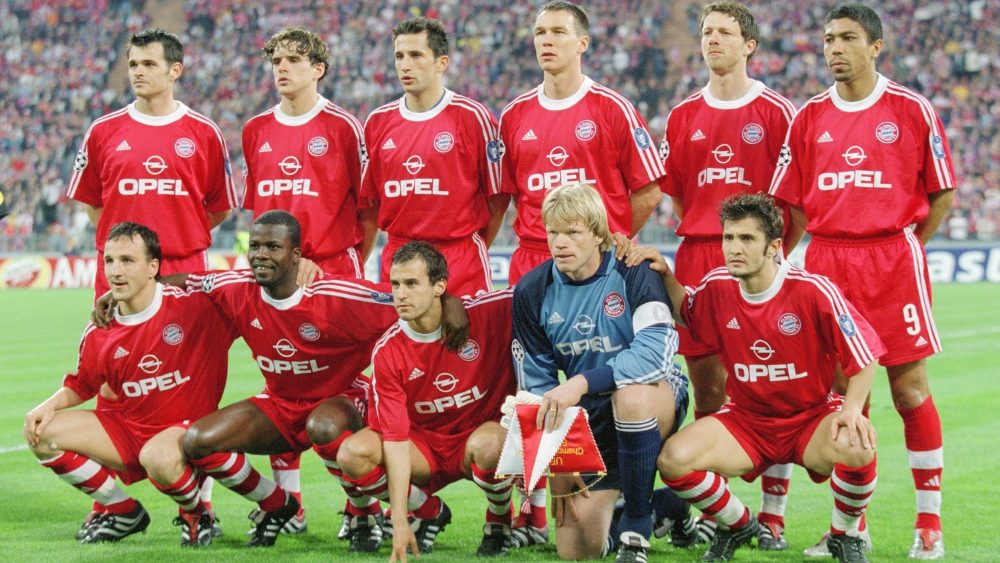FC Bayern – Miasanrot Advent Calendar, Door 23: Owen Hargreaves
FROM ZERO TO CHAMPIONS LEAGUE
“Ils sont les meilleurs – sie sind die Besten – these are the champions”, the anthem echoes from the loudspeakers in the Olympiastadion. The occasion: semi-final, second leg in the Champions League. FC Bayern is hosting the defending champions. The camera passes the faces of Elber, Roberto Carlos, Lizarazu, Figo, Raúl, Kahn and Hierro. The experience of countless battles has been etched in their faces.
One man who is made for such moments is missing: captain Stefan Effenberg is out on a yellow card ban. And so the camera pans to the face of a shy-looking 20-year-old curly haired man who stands in for the “boss”. Five weeks earlier, Owen Hargreaves had played at Grünwalder Straße against Sportfreunde Siegen.
LATE-CALLER EARLY STARTER
Born and raised in Canada, Hargreaves spent his youth in best North American fashion: hockey, American football and basketball were his sports. “Michael Jordan was my hero. That’s why I wore the number 23 at Bayern Munich,” Hargreaves explained his choice of shirt number in an interview with the BBC.
It was not until he was a teenager that he followed in the footsteps of his father, who was once an English journeyman in the Canadian Soccer League, and joined the Calgary Foothills. From there he moved to FC Bayern’s U19s as a 16-year-old.

He made his debut for the professionals in August 2000 at the age of 19, but still spent most of the season with the Bayern reserves in the Regionalliga.
In the Champions League, he had got a brief look in for a total of eight minutes in the first and second group stage and the quarter-finals before Ottmar Hitzfeld nominated him for the starting eleven against Real Madrid on that fateful Wednesday evening in May 2001. So now Claude Makélélé and Luís Figo instead of Martin Willmann and Artur Platek from Sportfreunde were on the cards.
The rest is history. Goals from Giovane Elber and Jens Jeremies gave FC Bayern a 2-1 victory and took them into the final against Valencia FC. There Hargreaves played alongside Effenberg and helped bring the long-awaited big eared trophy, the elite title in European football, back to Munich and overcome the trauma of 1999.
HARGREAVES AS A TECHNICIAN AND FREE KICK ARTIST
Hargreaves’ natural habitat was in central defensive midfield. He embodied the hard-working, strong-running worker who wasn’t above the occasional robust tackle. But Hargreaves was more than that. The Anglo-Canadian could also inspire with fine technique.
Years later, Jürgen Klinsmann coined the vision at Säbener Straße of wanting to make his players “better every day”. If he had tried to demonstrate to his players what he meant with a video montage of in-game footage, Owen Hargreaves would have been starring cast for a leading role. You could literally watch Hargreaves getting better every season. His development went so far that he was made designated to take free kicks more and more often in spite of teammates like Ballack, Deisler or Zé Roberto – and often converted them directly.
In the English national team, too, he managed to gain a prominent role and become part of this unfinished generation, despite notable competition from Carrick, Lampard and Gerrard. Although he converted on each occasion, the Three Lions were eliminated on penalties against Portugal in both the 2004 European Championship and the 2006 World Cup.
TOO EARLY A CAREER END CAUGHT BETWEEN MANY WORLDS
The Canadians and Welsh were angry with him for not playing for their national team. English fans and pundits had a hard time with him because his accent and manner were too Canadian and too German. It is therefore all the more remarkable that in 2006, at the age of 25, he was voted England’s Footballer of the Year by the FA.

After missing large parts of the 2006/07 season due to a broken leg, he moved to Manchester United in the summer of 2007. In doing so, he achieved a feat that only a few Bayern players have managed in the last 30 years: he left FC Bayern at the perfect time for the club for a good price. The €25 million that Manchester United paid marked a new record for FC Bayern. Previously, the best value was €8 million, which Barcelona had paid for Patrick Anderson.
In the first year, the transfer seemed to pay off for both Hargreaves and United. Hargreaves took on an important role in the team – and scored twice from free kicks despite Ronaldo. The season ended with Alex Ferguson’s team winning the Premier League and Champions League double. In the final against Chelsea, Hargreaves scored once again from the penalty spot.
Hargreaves had no idea that the Champions League final would be one of his last highlights. He spent the next few years mostly in rehab and on crutches. In three more years at Manchester United, he only made five appearances. His final season was spent at Manchester City, where he made three appearances before officially ending his career in 2012.
And so the Anglo-Canadian’s career may have ended too soon, but in a way it was nevertheless complete. Not least, Hargreaves was to be a harbinger for other successful players with Canadian or English roots at FC Bayern.









